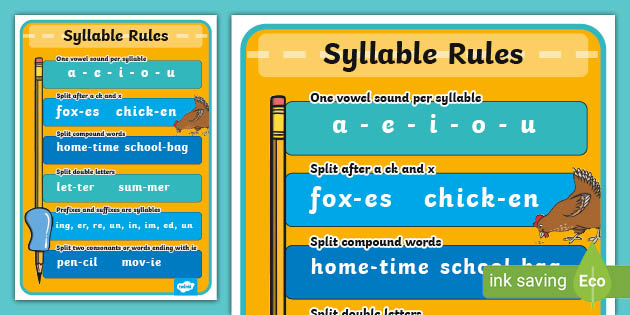
Speech Work: Syllables (continuation)

Syllables are formed when a vowel pairs with a consonant to create a unit of sound.
Some words have one syllable (monosyllabic), and some words have many syllables (polysyllabic).
New vowels sounds create new syllables.
- long
- This word has one syllable. There is only one vowel sound, created by the “o.”
- shame
- This word has one syllable. Even though there are two vowels, only one vowel makes a sound. The long “a” sound is the vowel sound; the “e” is a silent “e.”
- silent
- This word has two vowels sounds; therefore it has two syllables. The first syllable is “si” with the long “i” sound. The second syllable includes the letters “lent.”
How Many Syllables Are in a Word?
A syllable starts with a vowel sound. That vowel most often joins with a consonant, or consonants, to create a syllable. Syllables will sometimes consist of more than one vowel but never more than one vowel sound. Syllables create meaning in language. When vowels and consonants join to create sound, words are formed. A single syllable makes a single sound. Some words have one unit of sound, which means they have one syllable. More than one sound means the word has more than one syllable.
Monosyllabic Words
Words with one syllable (monosyllabic)
Single vowel sound
- man
- This word has two consonants and one vowel
- The one vowel sound (the short “a”) joins with the two consonants to create one syllable
- cry
- This word has two consonants and one vowel
- The one vowel (the long “i” sound formed by the “y”) joins with the two consonants to create one syllable
Double vowels with single sound
- brain
- This word has three consonants and two vowels
- The two vowels create one vowel sound (a long “a” sound)
- The single vowel sound joins with the three consonants to make one syllable
- tree
- This word has two consonants and two vowels
- The two vowels create one vowel sound (a long “e” sound)
- The single vowel sound joins with the two consonants to make one syllable
Words ending with a silent “e”
- lane
- This word has two consonants and two vowels
- The “e” and the end of the word is silent to represent a long “a” sound
- The single vowel sound in this word is a long “a” sound
- The single vowel sound joins with the two consonants to make one syllable
Polysyllabic Words
Words with more than one syllable (polysyllabic)
- baker
- two syllables
- This word has three consonants and two vowels
- “bak”: two consonants “m” “k” plus one vowel “a”
- “er”: one vowel “e” plus one consonant “r”
- growing
- two syllables
- This word has five consonants and two vowels
- “grow”: three consonants “g”, “r”, and “w” plus one vowel “o”
- “ing”: one vowel “i” plus two consonants “ng”
- terrible
- three syllables
- This word has five consonants and three vowels
- “ter”: two consonants “t” and “r” plus one vowel “e”
- “ri”: one consonant “i” plus one vowel “i”
- “ble” : two consonants “b” and “l” plus one vowel “e”
Grammar: Exercise on passive voice
Change the sentences below to a passive sentence
- He teaches English.
- The child is eating bananas
- She is writing a letter.
- The master punished the servant.
- He was writing a book
Composition: Cultism erodes tradition in society
Literature-in-English: meaning and explanation of a particular poem and identifying the figures of speech in the poem.
In Praise of the Farmer
You have settled your hoe to the soil,
You uproot trees with your bare hands,
You are the hero who does not care
That to fight is to die;
The sun and the rain are the same
When the soil must be tilled;
Your hands are the hands that harrow the soil:
The time is come again!
Show us now if you are still the man
That you have ever been!
The poem is praise poem, in praise of great king, or warrior. The writer praises the strength and the hard work of the person he is writing about
ASSESSMENT
What figure of speech found in the poem?
ANSWER
The use of hyperbole: we see the use of exaggeration in the poem. In lines 2, the poet says; “You uproot trees with your bare hands,” “ Your hands are the hands that harrow the soil:”

